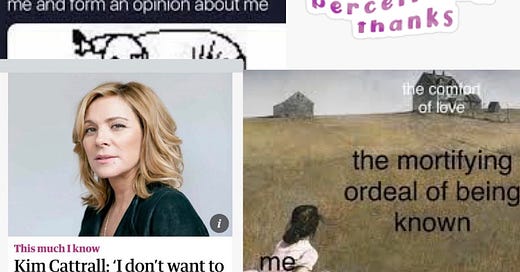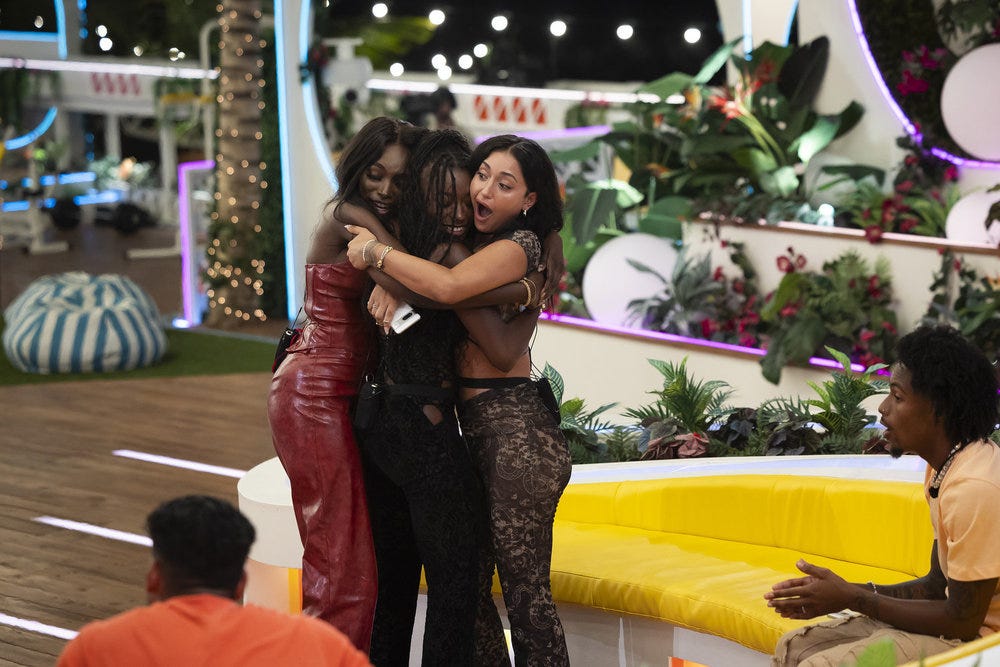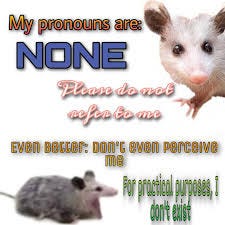It’s quite ironic that the qualities that propel us from people also often endear them to us. What agitates, disturbs, and annoys also has a way of binding. This crosses my mind whenever I’m watching a reality TV show, particularly one that offers as much visibility as Love Island, which airs a new 60- to 90-minute episode “every day but hump day.” I’ve been quite tapped into the most recent season of Love Island USA since the start. And, as is typical of the common viewer, I’ve danced across the broad spectrum of human emotion throughout my viewing experience. Sadness, contempt, disgust, elation - Love Island has gifted me all of it.
What I’m most often thinking about as I watch Love Island USA is how astounding it is that the show participants aren’t uncomfortable with the amount of personal access they are giving viewers. I’ve watched people admit to falling in love with someone they’ve known for two weeks in the context of what’s essentially a Panopticon, outfitted with dozens of hidden cameras and no contact with the outside world. I’ve watched people commit lewd acts with new partners besides people they admitted seeing a future with. I’ve watched people pass ketchup between each other’s mouths. I’ve watched them confess to not knowing whether the UK was in Europe.
You begin watching this show under the guise that all the participants are insanely attractive, somewhat dense individuals hoping to hard-launch a career in presenting or social media influencing. The whole thing is transactional - none of it is truly built on “finding love.” Yet, the tears, the screams, the sex - it makes you feel like you know them all a bit better. I would warmly invite JaNa, Serena, and Leah into my home any day of the week, and I type that with embarrassing earnestness.
Nonetheless, there is undeniably a part of your ego that feels inflated upon watching shows like Love Island. "I could never do that,” I think to myself with gratification, as I watch participants ugly cry on camera, donning strips of latex as swimsuits. I am quietly judgmental when I watch reality TV, but I think we all are a little bit. Transported away from the day-to-day stressors of our ordinary lives, we can all at least pat ourselves on the backs for not being this attention-hungry, this eager for the quickest possible route to fame and fortune. I’m self-congratulatory about my humility - so proud about how I can discredit others’ perceptions of me.
Only, that’s not the case. At least not entirely. I may not be a contestant on a televised dating competition show, but that doesn’t make me exempt from craving a slice of the spotlight. When I turn off the TV, I open my laptop and begin typing a personal essay to share with an audience of strangers, eager to mold their impression of me in the way I see best fit. I am not solely writing for attention, per se, but attention inevitably comes with an expanded readership. Particularly an online one.
Unlike many of my contemporaries, I’ve rarely felt the call to influencer-dom. To become a capital P Personality. Recording myself speaking to a camera, cultivating parasocial friendships with a robust body of followers - these behaviors don’t feel particularly natural to me. I don’t enjoy the sound of my recorded voice. I don’t enjoy rewatching footage of my face. And though I share a large level of detail about my life via my essays, there are parts of it that remain highly safeguarded on purpose.
People who have built the most lucrative online careers have done so by playing to the main strength of the internet: its accessibility. More specifically, by allowing followers to feel like they have enhanced access to you - even if the personality they’re accessing is a farce. “Content creators” on platforms like YouTube and TikTok primarily come to mind, especially figures like Emma Chamberlain, Troye Sivan, and others from the elder Gen Z internet era, of which I am a part. These personalities have been able to jump from internet famous to Famous famous by being generous in sharing the particulars of their lives and allowing advertisers, consumer brands, and media companies to take hold.
As a child, I, and most kids I knew, wanted to be entertainers when we grew up. Over time, this desire naturally shifted as the entertainment industry shifted. The initial dream of having your own Disney Channel show morphed into the dream of becoming a famous YouTuber, as our eyes collectively migrated to smaller screens. Unlike my elementary school self, who practiced drawing Mickey Mouse ears in the corner of a television screen with a ruler, my little sisters filmed themselves talking to their phones, simulating what their favorite vloggers were sharing on YouTube. This migration occurred because we didn’t actually want to become actresses or pop singers for the craft of art-making itself. No, we wanted - as many little kids desire - the ability to harness attention. Garnering not necessarily fortune, but certainly fame.
Today, the desire for attention endures into adulthood for many, as it always has. The accessibility of the internet just makes it that much easier to act on the impulse - to get people to look at you. The barrier to entry is a personal device, and we all have one near-tethered to our hand. Since we are controlling our presentational selves online - no larger stakeholders, no Disney Channel suits - we play a greater part in how our personalities are crafted and, in a perfect world, perceived.
Different platforms favor different types of access but in general, on long- and short-form platforms alike, there seems to be reverence reserved for people who offer viewers and readers a healthy amount of emotional vulnerability. This reverence is especially held by young women viewers for young women creators. Setting up your phone camera to cry about your breakup on TikTok. Opening up about physical insecurities in a YouTube vlog. And on Substack, indulging readers by exposing your rawest thoughts and personal stories, perhaps even offering a glimpse into past traumas to better illustrate your perspective. These behaviors often make creators appear more “authentic” and thus more personable.
The amount of personal access an individual chooses to offer online is, of course, entirely up to them. The anonymity and accessibility of the internet provide pathways for connection that may not otherwise be afforded to young people, especially those with identities situated on the margins, who are physically isolated from others like them. Nonetheless, in tandem with increased personal access is a clear heightened anxiety about perception. Among millennials and zoomers, memes about the discomfort of “being perceived” abound. “My pronouns are: none. Please do not refer to me. Even better: do not perceive me. For practical purposes, I don’t exist,” read several popular memes across Reddit and Pinterest. A pink, block-lettered RedBubble sticker urges onlookers to “please don’t perceive me, thanks,” in #relatable internet fashion. In many ways “don’t perceive me” has become the new “Cool Story Bro.” The new “Keep Calm and Carry On.”
I often feel the call to write about heavy life experiences for a number of reasons, ranging from seeking solidarity with others to wanting to work through my own feelings. Across my blog and my personal diary, I write to connect, to illuminate, and, selfishly, to salve personal wounds. Predictably, these reasons often blend and overlap. However, I have an ongoing fear of crossing a line. Of offering excessive personal access for the sake of it, conflating it with “good writing” when it’s really just a cumbersome confessional - a self-gratifying expulsion. In her latest newsletter, writer Alexandra Coburn writes about the regret she feels about publishing an intensely intimate essay written shortly after a painful breakup. “I was bleeding all over the stage, begging people to gaze openly at the viscera,” she writes.
I too worry that people will slip on my blood, or otherwise gaze too closely into my gashes. I want people to look at me, but not too closely. Just the right amount and in precisely the manner that I want them to. Nonetheless, offering yourself to the internet means risking lost context. It means risking ill-perception. And it means risking readers doing unwanted extratextual research. “In the age of Substack, the risk associated with sacrificing anonymity is much greater than it was before the internet,” Coburn writes, explaining that nowadays, writers have a “digital paper doll” version of themselves via their social media profiles that readers can intimately interact with. If people want more of you, they can and will find it.
I’m grateful for the sense of connection that the internet - and specifically, Substack - has granted me. Sharing my life experiences with others online has offered me a sense of community, as well as a validating conduit for self-expression. But I am ever-careful to hold my cards close to my vest, not only to preserve my personal well-being and the quality of my work, but to save some space for only myself. The compulsion to share online to cope with ill life happenings is strong. It gifts one an instantaneous emotional release - the feeling of being seen and heard. But once your guts are spilled, they’re impossible to un-spill. After you crack yourself apart for others to examine, it’s difficult to put yourself back together. One can’t be unperceived after they’re perceived.
That’s why I choose to view my writing and others’ writing as I view the characters I watch on Love Island: as caricatures and as fragmentations. To borrow Coburn’s language, as “digital paper dolls.” When we write (and when we post on social media), we embellish and we exclude. We filter and refine, all in the name of producing a satisfactory end product that best highlights the mood and message we want to deliver. As such, writing, especially about one’s life, is a process of telling half-truths, exaggerated truths, and fabrications. Writing - at least the writing I enjoy reading - is rarely precise reality transcription. It’s a simulation of reality, refracted through our personal preferences, stylistic choices, and unconscious biases.
That is exactly why I love to read and write. Why I love taking something as convoluted as life itself and placing a filter on it, imbuing it with an added layer of magic, bringing certain parts into sharper focus using words alone. Look closer, the writer asks, gaze at the viscera that I’m willing to show you. I’ll try to keep my guts tidy. And you, dear reader, can understand that your gaze is only partial. That your perception is limited, by your own positionality and by the amount I’m willing to share. That’s the beauty of writing and reading - embarking on a song and dance to seek understanding.









This was truly transcendent. I am so glad you wrote this. I feel like alot of what you write about really resonated with me. When choosing what to share and how to share it, I feel like that is where the storytelling lies! We are choosing to share our stories, thoughts, POV in a way that is inherently us, rather than a transcription of our day to day. I have slowly started to feel like when I share things online or write something that is published on the internet for all of eternity, in some way it's me claiming my own narrative and telling the universe that "this is me, and in this moment I am brave."
🙌🏻🙌🏻🙌🏻 fabulous as always! Why is it selfish to salve your personal wounds? Won’t your healing (and mine and everyone else’s) benefit the collective? What have we been brainwashed to feel about the concept of selfishness? Why does our own pleasure, profit or growth signify something negative towards others. It could…but doesn’t it seem to be our knee-jerk response that it will?